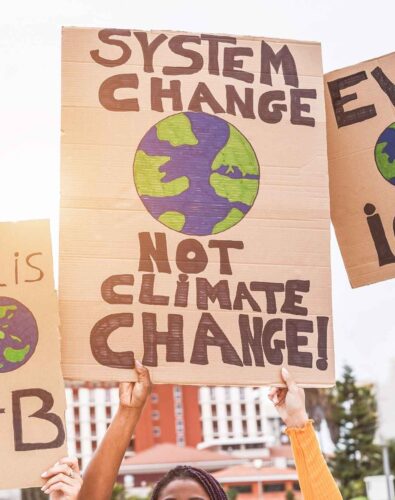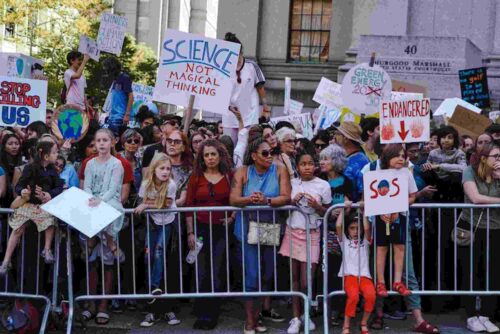Community Spotlight

Essay
How to Engage Students in Intergenerational Justice for Planetary Health: Insights from Nagasaki University’s Future Design Workshop
Their new reflection piece offers a step-by-step guide to running inclusive, cross-disciplinary workshops that blend imagination, systems thinking, and local context—a powerful model other institutions can replicate.
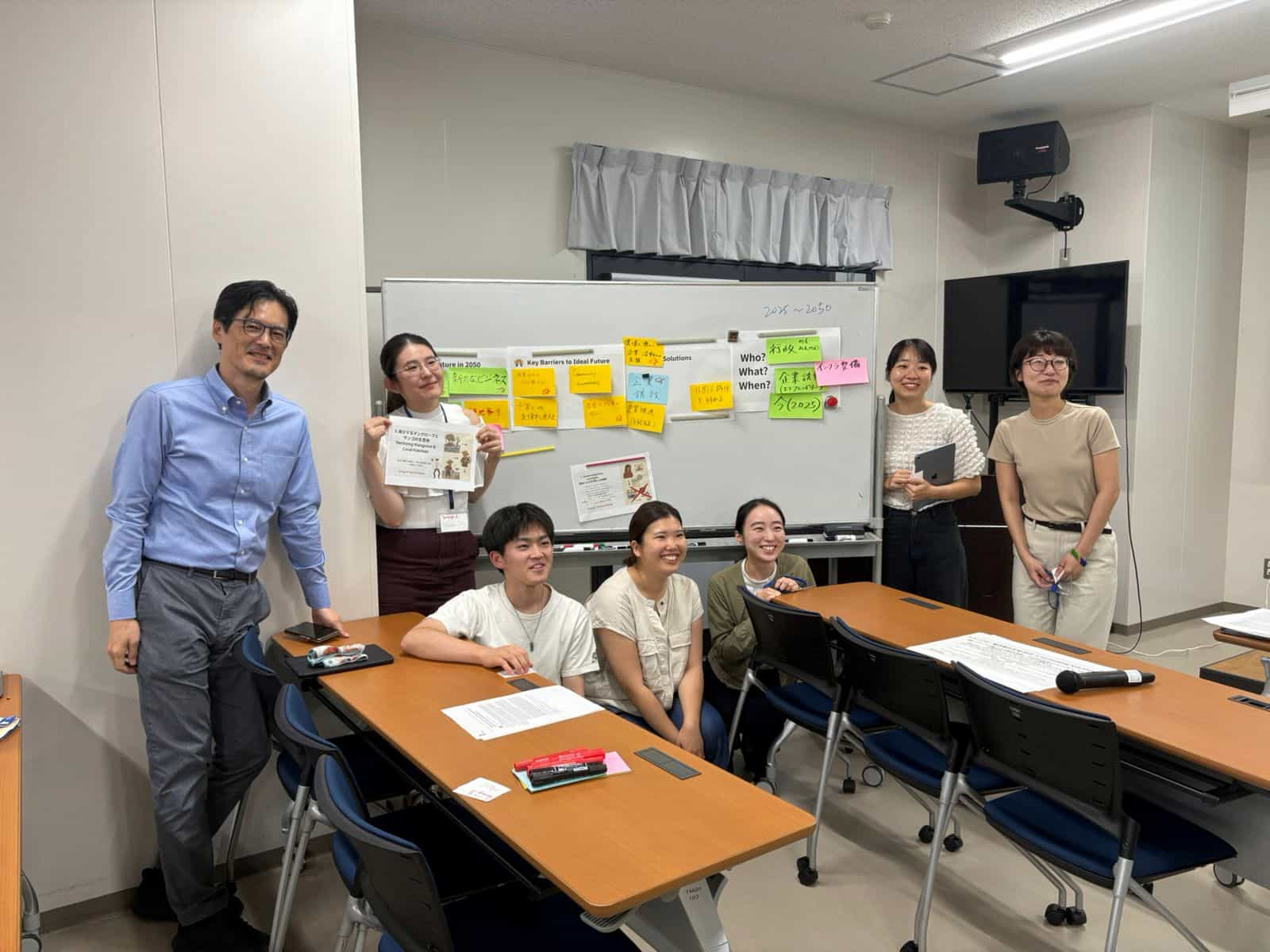
Learning, Co-Creation, and Action
On July 7, 2025, the members of the Interfaculty Initiative in Planetary Health at Nagasaki University and the Planetary Health Japan Hub hosted an interactive Planetary Health event titled “Advancing Social Determinants and Equity,” co-organised with the Planetary Health Alliance’s Campus Ambassador Program. The workshop brought together 20 participants from diverse disciplines and backgrounds, including experts on the intersections of climate change and social determinants of health, to reimagine Planetary Health futures for the year 2050. Participants gained critical insights into how climate change amplifies existing social and health inequities, disproportionately affecting communities already facing poverty, poor housing, and limited healthcare access. As highlighted by Dr. Nicole Redvers during the workshop, “The roots of planetary crises are intertwined with social and cultural systems that determine who is most affected and who is most heard.”
This reflection piece offers insights from the workshop to help other institutions design engaging events that inspire students to reimagine a more just and sustainable future for all.
Future Design Approach – Blending Knowledge, Sharing with Futuristic Planning
As the lead convener and the facilitator of the workshop, I was particularly inspired by the Future Design Approach, which invites participants to think from the perspective of future generations—a process that deeply resonated with me, given my commitment to inclusive, long-term public health planning. Through lectures and group activities, speakers introduced this Japanese-born methodology, which empowers students to step into community leadership roles and translate their visions of long-term, equity-centred solutions into concrete actions that address systemic environmental and health challenges.
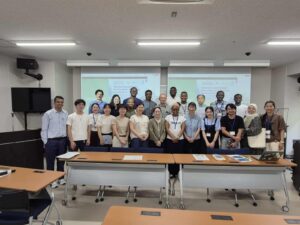
To attract a diverse pool of attendees, a shared call for participation was distributed through departmental mailing lists, class messaging groups, and faculty announcements. The inclusion of a student from the Katafuchi (economics) campus was particularly significant, as economics students often have limited opportunities to engage in interdisciplinary environmental health discussions typically centred in the medical sciences. This cross-campus participation reflected our effort to make Planetary Health dialogue more inclusive of diverse academic voices.
Framing the Workshop
As a DrPH candidate and medical doctor, I had the pleasure of delivering the opening remarks and set the tone for a session that would allow us all to grow in our understanding of how social determinants can affect the climate, and how in turn, the climate shapes those determinants. Thanking core partners including PHA, the Interfaculty Initiative in Planetary Health, and Nagasaki University, I emphasised that the smaller group size was intentional to enable deeper participation, dialogue, and co-creation.
The atmosphere was warm, with light refreshments provided, and participants were encouraged to follow up via email or LinkedIn with any questions or ideas for future collaborations.
Keynote Lectures: Setting the Stage
The workshop featured three powerful lectures examining the relationship between Planetary Health and social justice from diverse academic and cultural perspectives:
Nicole Redvers – Indigenous Knowledge and Climate Resilience
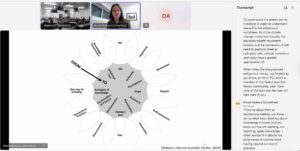
Dr. Redvers, a member of the Denínu Kų́ę́ First Nation and Associate Professor at the University of Western Ontario, shared insights on how Indigenous practices offer longstanding, place-based approaches to ecological stewardship. From coral nursery restoration to traditional herbal medicine, she demonstrated how ancestral knowledge systems are not only historically significant but also offer crucial guidance for today’s climate adaptation strategies. Her lecture highlighted the importance of moving beyond anthropocentric health frameworks toward more inclusive and relational models (Redvers et al. 2022).
Adjunct Professor Mary Eyram Ashinyo – Poverty, Health Access, and Education
Although Professor Ashinyo (Planetary Health West Africa Regional Hub Lead and Deputy Director at the Institutional Care Division of the Ghana Health Service), was unable to attend live, Prof. Ashinyo suggested we find a publicly available video that aligned with her lecture theme. We selected a relevant recording on poverty, healthcare, and education for the session. The insights served as a call to rethink resource distribution and infrastructure resilience in climate-affected settings (“Climate-Poverty Connections Fact Sheet” 2024; Ministry of Health, Labour and Welfare 2022).
Professor Noriko Fujita – Gender Equity in a Changing Climate
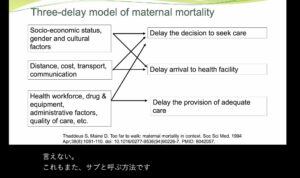
Professor Fujita (Nagasaki University) discussed how climate-related burdens—such as displacement due to extreme weather events and restricted land access—disproportionately affect women. Her lecture illuminated the necessity of involving women not as tokens but as essential decision-makers and knowledge holders in climate and health planning. She also emphasised the intersection of maternal and child health with broader environmental shifts (van Daalen et al. 2024).
Each of these sessions served to frame the group discussions and equipped participants with critical lenses for understanding the social roots and impacts of climate change.
Participatory Solutions Using the Future Design Approach
In our next activity, we broke into two groups based on language: Japanese and English. This division respected linguistic comfort and allowed for deeper engagement and expression as each group explored a case study based in Kijō Village, a fictional coastal community in Okinawa Prefecture, Japan. The case study focused on realistic threats, such as saltwater intrusion, youth outmigration, and energy insecurity, anchoring the discussions in a concrete socio-geographic context. (Shirai 2020; Brunner, Cable, and Iso 2020).
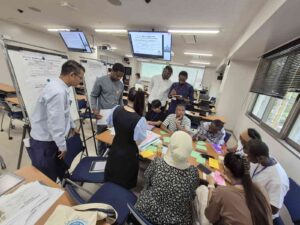
Using the Future Design Approach, each group imagined life in the year 2050 and backcasted to identify the steps needed to reach their desired future. They considered social, environmental, technological, and political dimensions and proposed interventions grounded in both innovation and local knowledge (Masters and Ramakrishnan 2023). I joined the English-speaking group, where we co-created strategies for sustainable healthcare access and renewable energy use. Participating in this collaborative design process gave me a firsthand sense of how imagination and policy thinking can merge to inspire realistic, community-driven change.
Facilitators and co-facilitators included:
- Panda Z, Hinano Seo, Emeka Nwankwo, and Le Thanh Tuyen (School of Tropical Medicine and Global Health (TMGH), Nagasaki University); Wodah-Seme Richard (Institute of Tropical Medicine (NEKKEN), Nagasaki University); Chanida Ekakkararungroj and Prakash Chandra Bhatta (Interfaculty Initiative in Planetary Health (IIPH), Nagasaki University)
Their leadership helped guide group discussions, ensure time management, and provide bilingual support throughout the workshop.
Co-Creating Solutions: Pitches for 2050
Each group concluded their session with a concise one-minute “pitch” presenting their proposed vision and solutions, mimicking real-life scenarios where community advocates must present ideas to decision-makers.
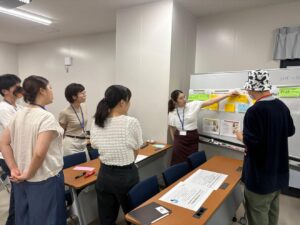
Group 1 (Japanese-speaking):
- Problem: Declining youth population and lack of sustainable businesses
- Vision 2050: A thriving local economy supported by eco-conscious enterprises and youthful innovation
- Solution: Collaborate with local government to attract eco-friendly private companies; provide incentives for youth-led startups that blend traditional practices with modern sustainability goals
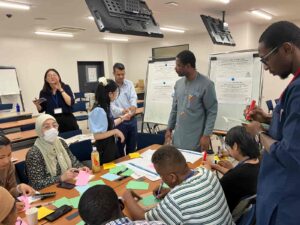
Group 2 (English-speaking):
- Problem: Frequent power outages are affecting vaccine storage and online learning
- Vision 2050: Stable healthcare access and inclusive digital education
- Solution: Invest in renewable off-grid energy sources (solar, wind) for health clinics and schools; enhance internet infrastructure; partner with NGOs and government to secure sustainable funding (“Climate-Poverty Connections Fact Sheet” 2024; Ministry of Health, Labour and Welfare 2022)
Each group demonstrated an understanding that addressing Planetary Health challenges requires both top-down policy support and bottom-up community-driven solutions.
Engagement, Reflection, and Next Steps
Throughout the session, participants were deeply interactive, raising questions about sustainability, representation, and power dynamics. They also reflected on the importance of intergenerational thinking, a core component of the Future Design Approach. The final presentations highlighted not only creativity but also feasibility, demonstrating the students’ ability to work collaboratively across cultures and disciplines. Participants shared insightful reflections about the session:
- “I had never considered the intersection of maternal health and climate before. This session opened my eyes.”
- “Being able to work in my language made it much easier to express our group’s ideas.”
- “This was my first exposure to the concept of Future Design, and it made me feel like we can influence long-term outcomes.”
In my closing remarks, I acknowledged that active discussions and solution-sharing made the session worthwhile, expressing gratitude to all speakers, facilitators, and attendees for contributing to a meaningful, collaborative space.
“We learned that Indigenous knowledge, poverty, and gender equity are not separate from climate; they are deeply intertwined,” I reflected. “Workshops like this help us practice imagining better futures and taking steps toward them.”
A Model for Inclusive, Future-Oriented Planetary Health Dialogue
This workshop was more than an academic exercise; it was a model of interactive, inclusive, and solution-oriented education that bridged disciplines, languages, and lived experiences. By grounding discussions in both real-world challenges and imaginative futures, the event reinforced that Planetary Health solutions must be co-created, not imposed.
It also illustrated that students and early-career professionals have critical roles to play as researchers, advocates, and future policymakers. The opportunity to engage deeply with the themes of justice, sustainability, and intergenerational equity provided me with skills and a renewed sense of responsibility.
As we face increasingly complex Planetary Health challenges, sessions like this one offer a roadmap for how institutions can cultivate informed, empowered, and collaborative leadership.
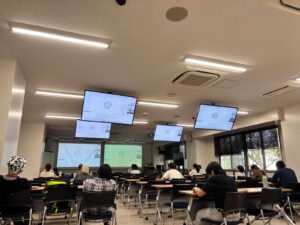
Based on my facilitation experience, future workshops could benefit from:
- Allowing more time for group presentations and Q&A
- Ensuring smoother transitions between in-person and online segments
- Developing clearer strategies to support more participants from other campuses
Acknowledgements & Special Mentions
We gratefully acknowledge the invaluable contributions that made this workshop a success. Special thanks to Professor Chiho Watanabe and the Members of the Steering Committee, Japan Hub, for their rigorous and cerebral reviews in shaping the workshop framework. We are also deeply thankful to Professor Ryuichi Komatsu for his ever-present supervisory support and guidance throughout the planning process.
Our appreciation extends to Professor Fumiko Kasuga, who generously allowed us to integrate our session into a portion of her Planetary Health curriculum. It is worth noting that the Graduate School of Tropical Medicine and Global Health (TMGH) actively incorporates practical Planetary Health into its graduate-level lecture series.
We also recognise the inspiring work happening in Osaka, where an interdisciplinary research space for Future Design, co-directed by Professor Keishiro Hara, served as a key reference for our methodological approach. The research space for Future Design has hosted numerous projects in collaboration with Osaka University, government bodies, and civil society actors.
Finally, a warm and heartfelt mention to Chantal Riggs for her constant encouragement, brilliance, and behind-the-scenes support that helped bring this vision to life.
More Information
About the Author

Dr. Adewunmi Oluwaseun Adebayo (Seun /Shay-oon/) is a medical doctor, public health expert, and advocate for integrating health policy with innovative healthcare solutions and technology. Currently pursuing a Doctor of Public Health (DrPH) degree at the Interfaculty Initiative in Planetary Health, Nagasaki University, Japan, they have over five years of experience in healthcare delivery and global health innovation.
Their work centers on addressing the intersections of climate change, mental health, emergency preparedness, and the well-being of vulnerable populations. Driven by a passion for equitable and sustainable health systems, they are dedicated to bridging the gap between policy and practice to promote resilience and inclusivity in global health.





